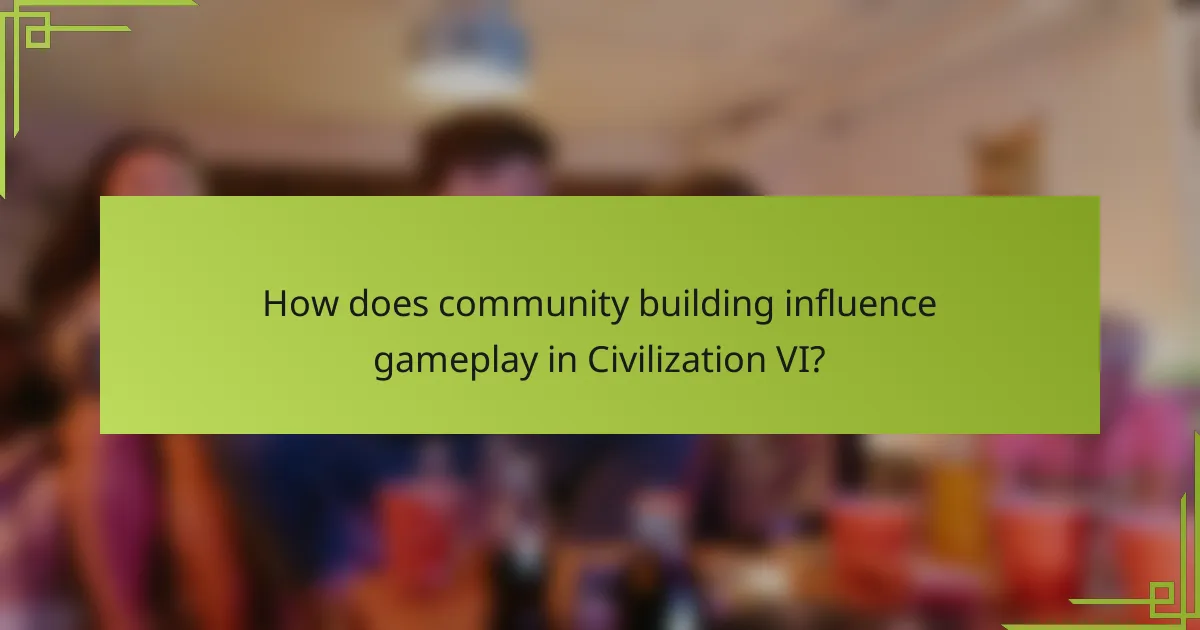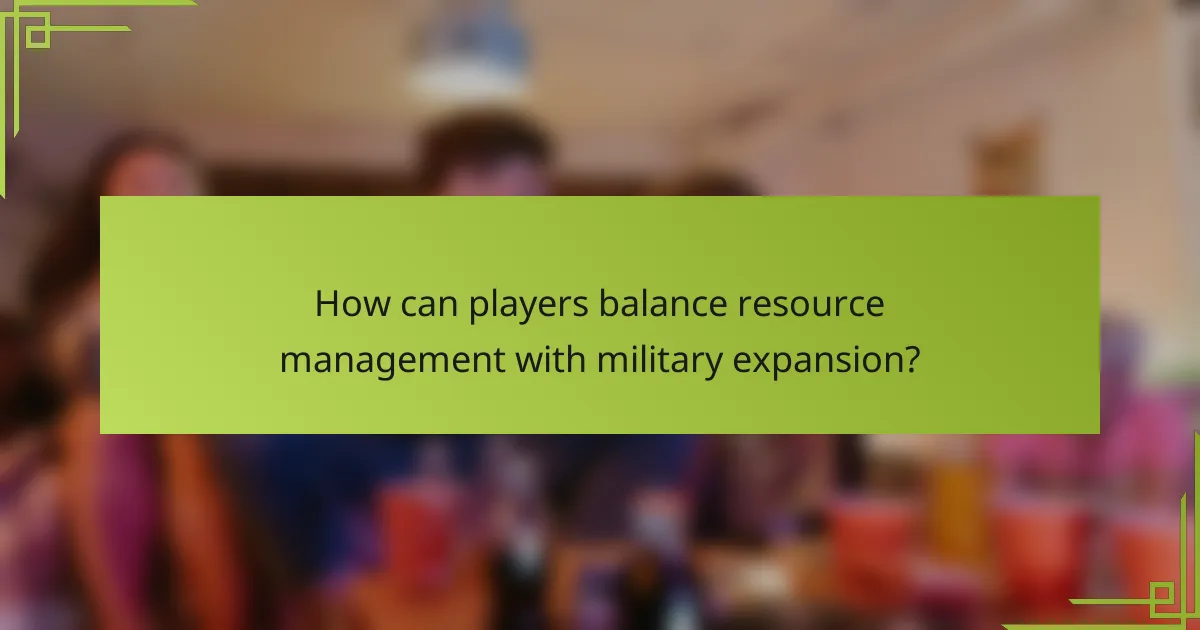Effective resource management in Civilization VI is crucial for success. Focus on strategic trade routes, optimising district placement, and leveraging unique civilisation abilities. Engage with other civilisations to build strong communities and enhance resource sharing. Avoid common pitfalls to maintain a balanced and efficient economy while expanding your territory.

What are the key strategies for resource management in Civilization VI?
Effective resource management in Civilization VI involves strategic allocation, prioritisation, and community engagement. Focus on balancing production, trade, and diplomacy to maximise resource efficiency.
Establish trade routes early to secure essential resources. Prioritise technologies that enhance resource yield and unlock new production capabilities. Engage with other civilisations for strategic alliances, which can provide access to rare resources.
Monitor resource consumption to avoid shortages. Utilise builders wisely to develop infrastructure that boosts resource output. Adapt strategies based on the unique attributes of your civilisation and the surrounding environment.
How do different civilisations impact resource management approaches?
Different civilisations influence resource management by introducing unique strategies based on cultural values and environmental conditions. For instance, agricultural societies prioritise crop rotation and irrigation, while industrialised civilisations focus on technology and efficiency.
Civilisations with strong communal ties often emphasise sustainable practices, promoting resource sharing and conservation. In contrast, competitive societies may exploit resources more aggressively, leading to depletion.
Historical examples illustrate these differences: the Incan civilisation utilised terrace farming for efficient land use, while the Roman Empire developed extensive road networks to optimise resource distribution.
Understanding these diverse approaches can inform modern strategies for sustainable resource management and community building.
Which resources are critical for early-game success?
Early-game success in Civilization VI relies on key resources such as food, production, and gold. Prioritising these resources ensures a strong foundation for growth and expansion.
1. Food: Essential for population growth, enabling cities to produce more units and buildings.
2. Production: Determines how quickly you can build infrastructure and military units.
3. Gold: Supports trade, unit maintenance, and purchasing essential items.
Focusing on these resources helps establish a thriving civilisation early in the game.
What techniques can optimise resource production?
To optimise resource production in Civilization VI, players can implement various strategies. Focus on improving infrastructure, such as building roads and improving trade routes, to enhance resource distribution. Utilise specialised districts to boost production efficiency, like Industrial Zones for manufacturing. Prioritise technologies that increase resource yields, such as those enhancing farming or mining. Additionally, establish strong diplomatic relationships to facilitate trade and resource sharing with other civilisations.
How can trade routes enhance resource management?
Trade routes significantly enhance resource management by improving access to diverse materials and fostering economic growth. They enable civilisations to trade surplus resources, ensuring a balanced economy and reducing waste. Additionally, trade routes can facilitate strategic alliances, promoting community building and cooperation among players. This interconnectedness often leads to shared benefits, such as technological advancements and cultural exchanges. By optimising resource distribution through trade, civilisations can strengthen their overall stability and prosperity.
What role does city planning play in resource allocation?
City planning is crucial for efficient resource allocation in Civilization VI. It determines the placement of districts, which directly influences resource production and community growth. Strategic planning maximises access to vital resources like food, production, and gold.
Effective city layouts enhance adjacency bonuses, increasing overall efficiency. For instance, positioning farms near fresh water boosts food output. Additionally, prioritising essential buildings ensures a balanced growth trajectory, allowing for sustainable community development.
In summary, thoughtful city planning directly impacts resource management, fostering a thriving civilisation.

How does community building influence gameplay in Civilization VI?
Community building enhances gameplay in Civilization VI by fostering alliances and resource sharing. Strong communities enable players to strategise effectively, leading to improved resource management and overall success. Collaborating with others can yield unique benefits, such as shared technologies and military support. Additionally, participating in community events can introduce rare resources and opportunities for trade, enriching the gameplay experience.
What are the benefits of strong community relationships?
Strong community relationships enhance resource management and foster collaboration in Civilization VI. They provide players with strategic advantages, such as increased trade opportunities and shared knowledge. A well-connected community can lead to more efficient resource allocation, improving overall civilisation growth. Additionally, strong relationships can lead to alliances, which offer protection and support during conflicts. Engaging with other players strengthens community bonds and encourages cooperative strategies, ultimately benefiting all involved.
How can cultural policies enhance community development?
Cultural policies can significantly enhance community development by promoting social cohesion and economic growth. They encourage participation in cultural activities, which fosters community identity and pride. Additionally, these policies often support local artists and cultural organisations, creating job opportunities and stimulating local economies. By investing in cultural infrastructure, communities can attract tourism, further boosting economic benefits. Engaging citizens in cultural initiatives can lead to improved quality of life and increased civic engagement.
Which wonders contribute to community building and why?
Civilization VI fosters community building through wonders that enhance cooperation and cultural exchange. Notable wonders include the Colosseum, which boosts amenities and entertainment, promoting happiness among citizens. The Great Library increases science output and encourages knowledge sharing. Additionally, the Eiffel Tower improves tourism and provides extra culture, attracting visitors and fostering connections. These wonders create an environment that supports collaboration and strengthens community ties.
What are effective methods for fostering loyalty among cities?
To foster loyalty among cities in Civilization VI, focus on strategic resource management and community building. Establishing trade routes enhances economic ties, while cultural policies strengthen loyalty through shared values.
Investing in amenities boosts citizen happiness, reducing unrest. Building wonders can also create a sense of pride, further solidifying loyalty. Encourage alliances with neighbouring cities to promote stability and mutual support.

What unique strategies can be employed for specialised resource management?
Unique strategies for specialised resource management in Civilization VI include focusing on trade routes, optimising district placement, and leveraging unique civilisation abilities. Prioritise trade routes to enhance resource acquisition and boost diplomatic relations. Optimise district placement to maximise adjacency bonuses, improving overall efficiency. Utilise unique civilisation abilities to gain advantages in resource production or management, tailoring strategies to specific strengths. These methods enhance community building and sustainability within the game.
How do advanced technologies alter resource management strategies?
Advanced technologies significantly enhance resource management strategies in Civilization VI by optimising efficiency and fostering community growth. Technologies like automation and data analytics enable players to allocate resources more effectively, reducing waste.
For instance, utilising advanced agricultural techniques boosts food production, ensuring sustainability. Similarly, innovations in trade routes improve resource distribution, promoting economic stability. These strategies lead to stronger communities and more robust civilisations, ultimately enhancing gameplay.
Incorporating these technologies allows players to adapt to challenges, ensuring long-term success in resource management and community building.
Which unique units and buildings enhance resource collection?
Unique units and buildings that enhance resource collection in Civilization VI include the Lumber Mill, Mine, and Commercial Hub.
The Lumber Mill increases production from forest tiles, significantly boosting wood resources. Mines improve yields from hills, providing essential minerals. The Commercial Hub enhances gold income, facilitating trade and resource acquisition.
Additionally, unique civilisation units, like the Khmer’s Domrey, can enhance food and production by providing bonuses in specific scenarios. Understanding these elements can optimise resource management and community building strategies.
What are the rare strategies that can lead to unexpected resource advantages?
Rare strategies for resource advantages in Civilization VI involve leveraging unique civilisation traits and unexpected diplomatic manoeuvres. One effective approach is to utilise lesser-known wonders that provide specific bonuses, enhancing resource production. Another strategy is to form alliances with city-states that offer unique resources, which can lead to unexpected economic boosts. Additionally, focusing on cultural policies that yield resource advantages can shift gameplay dynamics. Prioritising exploration can uncover hidden resources and opportunities, providing a strategic edge.

How can players balance resource management with military expansion?
Players can balance resource management with military expansion by prioritising efficient production and strategic planning. Focus on maximising resource output through infrastructure and trade. Establish a strong economy before committing to military growth. Use military units defensively to protect resources while expanding territory. Implement technologies that enhance resource gathering and unit efficiency. Regularly assess resource allocation to ensure sustainability as military demands increase.
What are the risks of prioritising military over resource management?
Prioritising military over resource management can lead to significant risks, including economic instability and community dissatisfaction. Resource depletion may occur, hindering future development. Furthermore, neglecting community needs can result in reduced loyalty and increased unrest among citizens. This imbalance can ultimately weaken a civilisation’s overall strength and sustainability.
How does military conflict affect resource availability?
Military conflict significantly disrupts resource availability in Civilization VI. Conflicts can lead to resource depletion, reduced production, and hindered trade routes. Players must adapt strategies to manage these challenges effectively. For instance, prioritising resource-rich locations can mitigate loss. Additionally, forming alliances may secure vital resources during conflicts. Balancing military engagement with community building ensures sustainable resource management.

What common mistakes should players avoid in resource management?
Players should avoid common mistakes like neglecting resource balance, failing to prioritise infrastructure, overlooking trade opportunities, and mismanaging city placements. These errors can hinder growth and community building in Civilization VI.
Neglecting resource balance leads to shortages that slow progress. Failing to prioritise infrastructure can result in inefficient production and slow development. Overlooking trade opportunities limits access to vital resources, which can stifle expansion. Mismanaging city placements can cause logistical issues and resource conflicts, impacting overall strategy.
By being aware of these pitfalls, players can enhance their resource management and strengthen their communities effectively.
What are the best practices for sustainable resource management?
Effective sustainable resource management in Civilization VI involves strategic planning and community engagement. Focus on balancing resource allocation and maximising productivity.
1. Prioritise resource diversity to ensure stability and adaptability.
2. Implement trade agreements to enhance resource availability and community relations.
3. Invest in technologies that improve resource efficiency and reduce waste.
4. Foster community projects that promote sustainable practices and resource sharing.
How can players effectively adapt their strategies mid-game?
Players can effectively adapt their strategies mid-game by assessing their resources, re-evaluating their goals, and making tactical adjustments. Monitor resource production and adjust city focus to optimise output. If facing military threats, prioritise defence by reallocating units or shifting production to military infrastructure. Collaborate with allies for trade benefits, enhancing resource availability. Analyse opponents’ moves to exploit weaknesses, such as targeting vulnerable cities or cutting off supply lines. Embrace flexibility in technology research to pivot towards advantageous paths based on current game dynamics.
What expert tips can enhance community building efforts?
Effective community building in Civilization VI relies on strategic resource management. Focus on establishing trade routes, fostering alliances, and optimising city placements to enhance collaboration. Prioritise cultural and scientific advancements to attract more citizens and strengthen unity. Utilise diplomatic strategies to resolve conflicts and maintain peace, ensuring a thriving community.